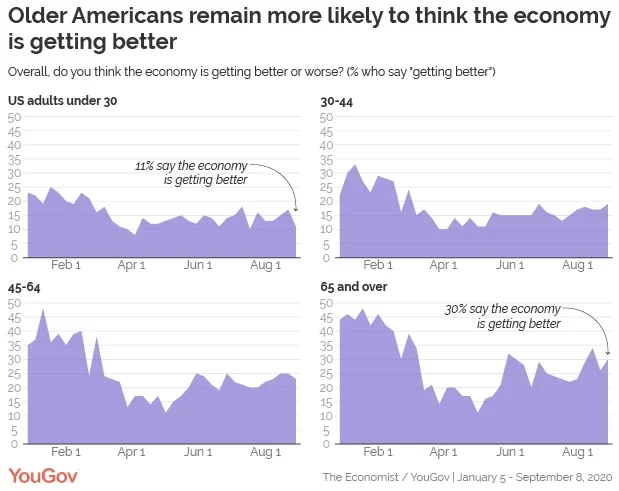Whether or not you think the economy is recovering from the coronavirus very much depends on how old you are, what race you are, and whether you’re a man or woman.
Overall, about one in five (21%) of Americans think the economy is getting better, about a quarter think it’s holding steady (26%) and 42 percent think it’s getting worse, according to new The Economist / YouGov Poll data.

However, a closer look demographics shows a disproportionately low number of young Americans, Black Americans and women think the economy is getting better.
Three in ten (30%) Americans over 65 years old say the economy is getting better, which is nearly three times more than those under 30 years old (11%). White Americans (26%) are five times as likely as Black Americans (5%) and significantly more likely than Hispanic Americans (15%) to say the economy is getting better. The economic effects of COVID-19 have particularly battered young and Black Americans, who are more likely to hold jobs in hospitality and retail, sectors which were the hardest hit in the economic shutdown.
American women, too, are much less likely than men to see a strengthening economy right now. Just 15 percent of women say the economy is getting better, compared to 27 percent of men.
The Economist/YouGov data also shows college grads (28%) are more likely than those with some college education (17%) and those with a high-school education or less (22%) to think the economy is rebounding.
The nation’s economic recovery is very much an important issue among the electorate and there’s deep division between supporters of each presidential candidate. Half (51%) of President Donald Trump’s supporters think the economy is getting better, compared to nearly zero (5%) supporters for Joe Biden.
See the toplines and crosstabs from this week’s Economist/YouGov Poll
Methodology: The Economist survey was conducted by YouGov using a nationally representative sample of 1,500 U.S. adult citizens interviewed online between September 6 - 8, 2020. This sample was weighted according to gender, age, race, and education based on the American Community Survey, conducted by the US Bureau of the Census, as well as 2016 Presidential vote, registration status, geographic region, and news interest. Respondents were selected from YouGov’s opt-in panel to be representative of all US citizens. The margin of error is approximately 3.4% for the overall sample.










